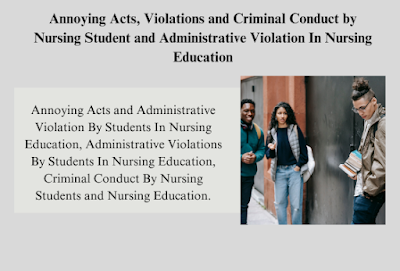The Annoying Acts Violations and Criminal Conduct by Nursing Student and Administrative Violation In Nursing Education. Nursing students may face a variety of mental health issues, including stress, anxiety, depression, burnout, and substance abuse. These difficulties can affect their academic performance, relationships, self-esteem, and physical health.
The Annoying Acts Violations and Criminal Conduct by Nursing Student and Administrative Violation In Nursing Education
Nurses are bound by this principle to choose medical interventions that achieve the best outcomes and cause the least possible harm to patients. However, they face an ethical dilemma when, for example, a patient exercises their right to autonomy and refuses to take life-saving medications or undergo treatment.
Discrimination has particularly negative effects on patients and healthcare providers. For healthcare providers, these consequences can include disciplinary action by the board of nursing, revocation of professional licenses, and legal proceedings.
State boards of nursing frequently discipline nurses for violations of professional conduct, including substance abuse, negligence, fraud, criminal convictions, and ethical violations. These issues can have serious consequences after a thorough investigation.
In the business world, the most common violations are discrimination, security breaches, and poor working conditions. But bribery, theft, and conflicts of interest are also examples. Many of these violations are not only morally reprehensible but also cross the line into illegal territory and are carried out outside the company.
Administrative Violation In Nursing Education In nursing education, maintaining a conducive learning environment is paramount. However, various challenges can arise, including annoying behaviors, administrative violations, and criminal conduct. Understanding these issues and managing them effectively is crucial for fostering a productive educational experience. This comprehensive guide explores these topics and offers insights into addressing and mitigating such concerns.
Annoying Acts and Administrative Violations in Nursing Education
Understanding Annoying Acts
Annoying acts, while not necessarily severe violations, can disrupt the learning environment. These behaviors typically do not breach official administrative codes but can negatively impact the classroom dynamics. Examples include:
- Monopolizing Discussions: Dominating conversations can hinder peer participation and collaborative learning.
- Discourteous Behavior: Aggressive or abrasive attitudes can create a tense atmosphere.
- Poor Time Management: Consistently arriving late or leaving early disrupts class flow and impacts group activities.
- Excuses for Poor Performance: Repeatedly attributing poor performance to external factors rather than personal accountability.
Addressing these behaviors proactively can prevent them from escalating into more significant issues. Educators should document incidents and communicate with students about how their actions affect the learning environment. Emphasizing the importance of professional comportment and aligning behavior with course objectives can lead to constructive changes.
Administrative Violations
Administrative violations are more serious and involve breaching institutional codes of conduct. These behaviors can disrupt the educational process and may include:
- Academic Misconduct: Cheating, plagiarism, and falsifying results.
- Intimidation and Harassment: Actions aimed at intimidating or harassing peers can create a hostile learning environment.
- Substance Abuse: Being under the influence of alcohol or drugs during class, especially in institutions with zero tolerance policies.
Faculty should familiarize themselves with their institution’s specific policies and procedures for handling such violations. When a potential violation is suspected, documentation and a timely discussion with the student are crucial. If necessary, involve administrative officers to ensure appropriate disciplinary action.
Criminal Conduct in Nursing Education
Defining Criminal Conduct
Criminal conduct involves behaviors that violate local, state, or federal laws and can severely disrupt the educational environment. Examples include:
- Violence or Threats: Any form of violence or threats toward others.
- Stalking or Intimidation: Persistent and unwanted attention that causes distress.
- Possession of Illegal Items: Carrying firearms, drugs, or alcohol on campus.
- Theft: Stealing personal or institutional property.
Managing Criminal Conduct
Due to the severe nature of criminal conduct, faculty should act swiftly and coordinate with campus law enforcement. Steps include:
- Document Observations: Record any incidents or behaviors that may indicate criminal activity.
- Report to Authorities: Immediately inform campus law enforcement and the department chair.
- Follow Institutional Procedures: Adhere to the institution’s protocol for reporting and managing criminal behavior.
Title IX Considerations
Title IX of the Education Amendments of 1972 prohibits sex-based discrimination and violence. Faculty must report any incidents of sexual violence or harassment promptly, regardless of the victim’s decision to involve law enforcement. This compliance ensures a safe learning environment and supports victims’ rights.
Balancing Roles
While faculty may have insights into the student’s behavior, their primary role in criminal cases is to support the investigation and cooperate with law enforcement. The administrative review may follow a criminal investigation, focusing on the student’s conduct within the educational setting.
Read More:
https://nurseseducator.com/didactic-and-dialectic-teaching-rationale-for-team-based-learning/
https://nurseseducator.com/high-fidelity-simulation-use-in-nursing-education/
First NCLEX Exam Center In Pakistan From Lahore (Mall of Lahore) to the Global Nursing
Categories of Journals: W, X, Y and Z Category Journal In Nursing Education
AI in Healthcare Content Creation: A Double-Edged Sword and Scary
Social Links:
https://www.facebook.com/nurseseducator/
https://www.instagram.com/nurseseducator/
https://www.pinterest.com/NursesEducator/
https://www.linkedin.com/in/nurseseducator/
https://www.researchgate.net/profile/Afza-Lal-Din
https://scholar.google.com/citations?hl=en&user=F0XY9vQAAAAJ
